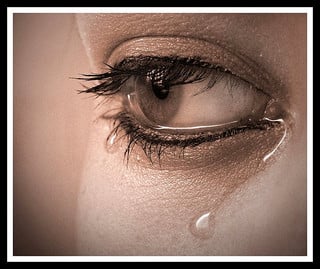Both on my original post on abstinence-only sex ed and on the follow-up, I’ve had quite a few commenters object to my insistence that girls (and boys) shouldn’t be taught that premarital sex makes them dirty. Some of the commenters cautioned that an attempt to remove the idea of premarital sex making one “dirty” can quickly morph into an attempt to remove any residual shame or guilt, thus short-circuiting the developing conscience of an adolescent. Others simply conflated the words “dirty” and “shameful”, insisting that they are one and the same.
“And yes, both girls and boys who have premarital sex are dirty. They have been soiled and will not be pure for their future spouse, if they are called to marriage. What is wrong with saying this? Why is it wrong to make someone feel dirty or sinful if they have engaged in premarital sex (which is dirty and sinful)? It is shameful and dirty and their experience will be baggage that they bring into a future marriage.”
This comment is admittedly among the most vitriolic, but I’m using it here because it’s also a clear, non-nonsense example of this indiscriminate conflation of shame and filth.
In the Catholic faith, all sins are not equal. It’s one of the many things I love about our Church. It’s such a common-sense approach to sin (and life, and everything). Of course stealing a candy bar is not the same as murdering someone in cold blood, and it’s silly to insist that it is. Extra-marital sex, whether it be pre- or post- matrimony, is a grave sin. A mortal sin. So is stealing. So is murder. Let’s say your 13-year-old, in a fit of fury over the Ipod she didn’t get at Christmas, steals one from Best Buy and then owns up to it later. You wouldn’t say to her, “stealing makes you dirty. You are shameful and dirty!” Same thing with a murderer. Murder is objectively worse than premarital sex, but even so, serial killers aren’t usually referred to as “dirty” or “disgusting” unless they are also guilty of rape or sexual assault. Sins that involve sex in any way (even sins where the genitalia don’t participate, like watching pornography) are exclusively thought of as “dirty” or “filthy.”
In The Divine Comedy, Dante’s organization of Inferno and Purgatorio is telling. While Catholics tend to treat sexual sins as some of the worst, and the rest of the world regards the Church’s teachings on sex as borderline obsessive, Dante’s organization of hell (which is reasonable both in medieval theology and in common sense) suggests otherwise. Lust is the least of the sins in both the Inferno and the Purgatorio. In fact, Dante finds Cunizza da Romano, a woman notorious for her many love affairs, in heaven. A priest once told me that sexual sins should be the easiest of the grave sins for us to confess, because they are the least rebellious. Indeed, sex is an act of vulnerability, one that requires a person to be literally naked, physically and spiritually, exposing their flaws along with their beauty to someone else. As such, sexual sin is usually the sin that leaves a person feeling the most exposed, ashamed, and wounded. Yet instead of responding with compassion and gentleness, too often people respond with further condemnation, wielding adjectives like dirty, filthy, soiled, spoiled, or ruined.
Sometimes a caveat is thrown in about forgiveness, occasionally referring to confession and absolution. The thing is, “dirty” is a uniquely physical adjective, and while the confessional might cleanse our souls, it’s not a shower. The OED defines dirty as “characterized by the presence of dirt; soiled with dirt; foul, unclean, sullied.” Spiritual healing and forgiveness don’t cleanse the body. Any adolescent will realize that paying lip-service to forgiveness doesn’t address being soiled, foul, and sullied. I have a million theories about why sexual sins are uniquely perceived in terms of bodily filth, but there are two in particular that I believe work in tandem to foster this connection in today’s culture.
Sex involves a certain amount of messiness. It’s a physical act in a way that few other acts are. We throw our whole bodies into it, sweat, saliva, semen and all. Afterward, we usually feel kind of grimy. The post-coital shower is a thing for a reason. It’s easy, then, to associate feelings of sexual shame with the physical feeling of being dirty. Perhaps it’s even a natural association. The problem with fostering this association is that it creates a psychological link between sex and filth that is extremely difficult to break. Even girls who haven’t had premarital sex but have been taught to associate sex with being soiled will have a hard time dropping that association when it comes to sex within marriage, especially in the early days of marriage, when sex is less likely to be an ecstatic union of body and soul and more likely to be clumsy, awkward, and maybe a little frustrating. Saying that extra-marital sex makes someone “dirty” does not cultivate a healthy sense of shame; it cultivates a sense of irrevocable spoilage, which is directly fed into by our cultural mores.
Contemporary American culture, a culture that has so influenced other first-world cultures, is profoundly shaped by the heavily Calvinist-influenced Puritanism at its roots. Sex is dirty, according to common Puritan tradition, a dirty (but lamentably necessary) function of a dirty and depraved body. In Calvinist theology, the whole body is dirty, corrupt, depraved, and sin can never be removed. Forgiveness only means that Christ moves to stand between us and God, so that we look clean, although we never really will be. Snow covered dung-hills, that’s what we are. So sexual sins just make us even dirtier, even filthier, even more irreversibly ruined. This is the antithesis of Catholic teaching; even so, the mentality has shaped and molded our culture, which has shaped and molded us, to the point that professed Catholics will say, “Why is it wrong to make someone feel dirty or sinful if they have engaged in premarital sex (which is dirty and sinful)?”
First and foremost, it’s wrong because it is not our responsibility to make anyone feel dirty or shameful. Sometimes it is our responsibility to point out when someone else is engaging in sin. Sometimes (but far more rarely than most seem to think) it’s the only loving response. Certainly in the case of our children, we have an absolute duty to educate them about sin, and to help them identify sins which they are prone to. But the punishment for sin lies in the hands of God. Imposing shame is not the same thing as helping identify sin and form a conscience. Shaming our children, shaming anyone, is a form of punishment which people too often dole out almost gleefully, citing Matthew 18 while ignoring Matthew 9.
It’s also wrong because you’re fostering that psychological connection between sex and filth. By emphasizing a purely physical consequence, you’re subconsciously shifting sex from a physical and spiritual plane with both physical and spiritual consequences to the plane of the purely physical. You can ho-hum about psychology all you want, or take a page from one of my commenter’s playbooks and “suggest that the main reason women feel uncomfortable-to-wrong about sex in marriage has little or nothing to do with their sex education, and everything to do with the way their husband approaches them,” but the human mind is an intricate and powerful thing. You can’t acknowledge that watching porn re-wires a man’s brain while simultaneously dismissing the possibility that hearing “sex will make you dirty, sex will make you dirty” throughout her formative years will result in a woman feeling dirty about sex.
Finally, it’s wrong because you’re contributing to the sexual schizophrenia that has so effectively marred the landscape of our culture, elevating the taboo of sex into a cultural holy grail, paralyzing men and women from developing healthy sexual relationships, stunting and twisting our understanding of sex and of each other until we’re bequeathing unto our children a sexual wasteland. Don’t believe me? Allow the Anchoress to explain:
“Calling sex “dirty” might have been an expedient way for parents and societies to address the complex relationship between our sexual and our spiritual natures; but by not unpacking those complexities clearly, openly, and wisely, past generations became complicit in communicating an idea of shame that has fomented neurosis and an inevitable over-correction. Sex went from being something mysteriously sacred to something efficiently nonchalant.
Sex outside of marriage is not sinful (that unpopular, unfair word that makes us feel bad about ourselves) because it is ‘dirty.’ It is sinful because, when rendered casual and sterile, the act by which we most closely work with God in creation, the act that takes us into the deepest recesses of our physicality — to our very essences — becomes reduced to nothing more than an end unto itself. Sex is separated from the energetic and spiritual realm in which it is most fully and functionally realized. The sin comes, not because we are bad, but because by our willful action we have removed our emphasis from the spiritual and chained it to the corporeal. We’ve assisted in the exploitation of ourselves and others.”
(Elizabeth Scalia, Strange Gods, p 85)
This habit of conflating “dirty” with “sinful” and feeling “filthy” with feeling “ashamed” is so ingrained in our society that although I made no mention of shame being a negative emotion in my original post, many of my commenters assumed that was what I meant.
“Correct me if I’m wrong, but it seems that you are saying that anything that causes feelings of shame is damaging?”
That is not what I said. Just a little reminder: I freely converted to Catholicism. We do shame and guilt like no one else, for good reasons. I wrote about Catholic guilt here, and how grateful I am for the suckiness of it. Our Papa recently reminded us that shame is a Christian virtue. In a way, shame is damaging, but it’s damage that must be done so that we can be healed, like setting a bone. I would never suggest that shame is something no one should ever have to feel. I fervently hope that my children grow up with a healthy, proportionate sense of shame that helps them remain in a state of grace without driving them into scrupulosity.
But that’s not what Elizabeth Smart felt after her rape. That’s not what many women feel, even in otherwise healthy and happy marriages. That’s not what I have struggled with for many years.
This is a real thing, and it’s not a fabrication of our society to excuse away guilt and shame. It’s not just desserts for sleeping around. It’s not a natural reaction to husbands objectifying their wives. It’s not any of the other things that people claim it is to ignore the inconvenient suffering of real people, and the responsibility that lays on us, our generation, right now, to find a better way to talk about sex. You might not know what that better way looks like. I don’t either. But that’s no excuse for continuing on with the status quo and turning a blind eye to the damage that results.
***
One of the hazards of blogging from home is trying to think through complex issues while being interrupted 4,700 times to refill water, break up fights, kiss boo-boos, get the toddler off the kitchen counter, and fish kitchen tongs out of a four-year-old’s pajama drawer. Although I spent an inordinate amount of time on this post, I’m not completely satisfied with the coherency of it. This is an issue I’m still trying to work out for myself, so please leave any thoughts you may have below. Also, I am not presenting myself as an authority on this, so comments about how I’m destroying the fabric of Christianity with my feminist angst and lukewarm morality won’t be deleted, but they will be annoying. Constructive criticism, per favore.











